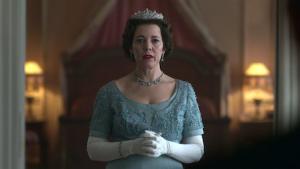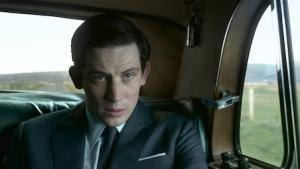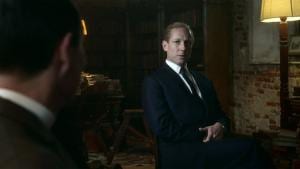 It has been said that the current programming available on television is the very richest and most interesting it has ever been in the history of the medium. Of course, tastes vary enormously; for every “Game of Thrones” junky (not me) there are more than a few “Jack Ryan” aficionados. The former claims a kind of seriousness (that claim escapes me), while the latter is mere fluff (I binged on that fluff). Still, TV offers a vast array of programs that titillate, challenge, enrage, and cause thought. For me, “The Crown” in season three falls in the thought category. (Warning: I am not a TV critic, nor have any pretense to be such. I just like what I like, though I try to watch with brain engaged.)
It has been said that the current programming available on television is the very richest and most interesting it has ever been in the history of the medium. Of course, tastes vary enormously; for every “Game of Thrones” junky (not me) there are more than a few “Jack Ryan” aficionados. The former claims a kind of seriousness (that claim escapes me), while the latter is mere fluff (I binged on that fluff). Still, TV offers a vast array of programs that titillate, challenge, enrage, and cause thought. For me, “The Crown” in season three falls in the thought category. (Warning: I am not a TV critic, nor have any pretense to be such. I just like what I like, though I try to watch with brain engaged.)
I watched the first two seasons of “The Crown,” the long history of the reign of Elizabeth II, which as of this writing has definitely not ended. The show also has lengthy looks at those who surround the queen: her husband of 72 years, Phillip (also still living, though now in seclusion primarily), her children, Anne, Andrew (currently in the midst of serious scandal), Charles, and Edward. The queen’s controversial sister, Margaret, received a lot of screen time in the previous season. This third season turns its lens much more on Charles and Phillip. Up to now in the show, external events have regularly determined the focus, and the royals’ varying reactions to those events. This reality continues in season 3, but I sense a rather more serious attempt now to examine not only the reactions to events, but more specifically how those reactions are intensely personalized.
Let’s begin with Charles, played quite wonderfully by Josh O’Connor (a lovely Lawrence Durrell in the PBS show, “The Durrells in Corfu”). In the episode where he is at Cambridge (did you know that he is the first royal ever to obtain a degree?), he vastly enjoys his time in the Dryden Club, the theatrical troupe of the University. Suddenly, it is decided by the queen and her counselors that Charles needs to be made Prince of Wales. The Welsh, during the 1950’s and 1960’s especially were quite restive, thoroughly uncomfortable with being merely a part of Great Britain, a threat, they felt, to their own culture, history, and particularly language. The episode depicts Charles being extracted from his beloved Cambridge, and dropped into the premier Welsh university, Aberystwyth, on the western coast in order to learn Welsh, or at least enough of the thorny tongue to give his acceptance speech in the language at his investiture as Prince of Wales. Few Welsh are pleased that an English boy has been chosen to be chief monarch over their proud land, a boy who is depicted in the show as not even knowing who the great Welsh hero, Llywelyn, first king of Wales in the 12th and 13th centuries, was. (I find it hard to imagine that a Cambridge undergraduate would not know that, but I may be quite wrong.)
Charles is at first quite lonely in his very spare room at the Welsh university, but over the months of his language study, mentored by an avowed anti-royalist professor who at first detests the boy, but grows over time to understand his loneliness and his reluctance to impose his Englishness on the Welsh. Charles over the same time begins to understand the pride and isolation of the Welsh, and sees in their plight something of his own isolation in the family. At the investiture at Carnarvon Castle, Charles reads the speech written for him, but unbeknownst to his family and the speechwriters, he adds some words of his own that honor the Welsh culture, for which his Welch-speaking listeners are very grateful.
When he returns home to England, after the great spectacle of his investiture, he is met by no member of his own family, including his mother, who has gone to bed. He demands to see her, and in a tense confrontation, she reveals that his own additions to the speech were not welcome to her or to any of his family. She tells him directly that he may think he has a voice of his own, but “no one wants to hear it.” We royals, she says, may have no opinions or passions of our own, but must maintain an isolated gravitas in order to keep up the illusion of untouchable power.
I found this deeply moving, as Charles sees in his Welsh friends, overwhelmed by centuries of English conquerors, something of his own pain as one cut off from human contact. The royal family is portrayed as a decidedly dysfunctional one, and each member is left to fend for him/herself as well as they can. Few genuine contacts are seen between any of them. Here I find an important lesson in human caring. Charles, while in Wales, witnesses how two parents put their child to bed with warmth and kisses. Immediately, he realizes that he has never had that experience, and it drives him to express his pain in his investiture speech. His mother, the queen, is having none of that sentimental twaddle, but it is exactly that sort of thing that makes us a human family.
This is made even more powerful in the next episode where we see Phillip much taken with the first landing on the moon by American astronauts in 1969. He sees in that magnificent achievement the very pinnacle of human striving and greatness. In contrast, Phillip is reduced, he thinks, to making speeches at concrete conventions and bridge openings, pathetic and worthless actions in his mind. He stops attending church, and instead takes that time to run, to get in shape, to stave off the crisis that is brewing in his own life. Meanwhile, the queen has determined that a new minister is needed for the royal chapel, and a younger man, the Rev. Woods, is named. The new minister soon asks Phillip if he may use one of the many buildings on the royal grounds for a retreat center for clergy who have burned out in their ministries. Philip agrees, but in reality cares little for such ponderous and lazy talk as a way to address one’s depression. At first, he shouts at the clergy assembled that they should get off their duffs and actually do something, like those magnificent astronauts.
Much to Phillip’s delight, the three American astronauts, include a visit to the royal English family in their round the world tour after their glorious trip. Phillip requests a private meeting with the three, fully expecting them to have deep profundities to impart to him. During the meeting, they offer Phillip little that is profound, describing, for example, that after they had walked on the surface of the moon, the first humans to do so, they merely got back in the lunar lander, and tried to sleep before blasting off for the circling module and the return to earth. Unfortunately, reports Buzz Aldrin, a clanking water heater kept him awake! Phillip is crestfallen and ends his conversation no wiser or more enlightened.
Finally, we see Phillip once again among the struggling clergy at St. George’s House, admitting that he needs help rediscovering just what the meaning of his life is. He has lost his faith, he says, and his nothing to replace it. “Help,” he whispers, “Help me.” Once again, I found this scene deeply moving. All of us, royal or not, need one another, especially when we have lost our way. Words on the screen reveal to us that Phillip and the Rev. Woods became lifelong friends after this encounter, and that St. George’s House continues to this day to be a place of retreat for many searching people. Phillip considers his gift of St. George’s House as a place of retreat his finest human work, we are told. Both Charles and Phillip, his father, found help and hope in very unlikely places.
I found both these episodes of “The Crown” to be beautifully written and acted, and seriously concerned with genuine human needs. In short, for me they were sermons that did not pound into me things I must take seriously, but rather showed to me just how serious human need is, the need for caring and thoughtful connections that make life meaningful. Great preaching does that, and great preaching is not confined to pulpits of a Sunday morning.
(Images from “The Crown” official website)











